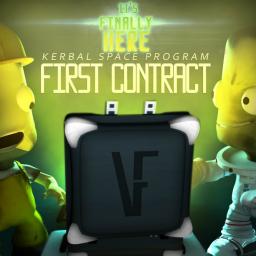 The Kerbal Space Program has just released an update called "First Contract," a name chosen by the popular indie game's active user community
The Kerbal Space Program has just released an update called "First Contract," a name chosen by the popular indie game's active user community. It introduces the concept of funds and contracts to the basic science career mode, giving a sense of purpose to the space agency simulator.
Other new aspects to the game with this update include all new agency icons (they were all fan-created and voted on), and the new factor of reputation as well: keeping those little green dudes alive actually takes on importance.
1 The game has all the goodness of a fully functional career mode, and there is now 64 bit support for both Windows and Linux (the Linux version has been 64 bit capable for some time now). If you have been hiding in a cave for the last 3 years here is a link to their
homepage. Available through the website or Steam. $26.99 US at this time.
So, go forth and build rockets! In the famous words of Jebidiah Kerman, 'Splosions are the sprinkles on your ice cream sundae.'
1 If reputation is a factor, I am in trouble for certain.
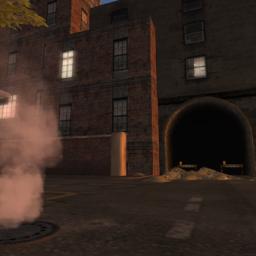
Laura Hall over at Atlantic Magazine asks: what happens when digital communities are abandoned? Although she covers the closing of Geocities, she's really more interested in the virtual worlds we build in our
MUDs and
immersive games.
Though they swarm with players for long periods of time, as user interest wanes and gamers go elsewhere, then what do they look like?When Second Life launched in 2003, the world was captivated by visions of Neal Stephenson's Snow Crash come to life. The virtual world isn't a game--it's a venue, a platform, a plot of undeveloped land, a blank canvas, an open world. Users make of it what they will. ...
But that was nearly 10 years ago. I wondered: what happened to all of those buildings? Were people still making use of them? So I logged in. The world of Second Life, it turns out, is not abandoned. Estimates put the current active user-base around 600,000 members; in its heyday, it boasted between 60 and 80 thousand simultaneous logins. There are often a handful of people in most of the spaces you'll visit, but it's easy to find privacy. Here and there are signs that point to its lack of people: "space for rent", "band wanted." But the sheer variety of environments, and the obvious care that people put into them, remains stunning.
PCWorld is running an article about the rise of quality games on the Linux platform .
For the first time in a long time, Linux gamers have a reason to smile. Gaming on the open-source operating system has long meant dabbling in Wine and arcane workarounds, but ever since Valve launched Steam for Linux just over a year ago the number of native Linux games has positively exploded.
Sure, Valve's embrace of Linux may have a wee bit to do with advancing the Steam Machine ideal, but any game released for "SteamOS" works just fine on other Linux distros, too. Here are 7 killer, big-name PC games that've recently become Linux natives-starting with a juggernaut that landed on Linux just this week.
Warning: it's one of those articles where you have to click 7 times to see all ten entries, but if you can stomach the format, it's a pretty interesting article.
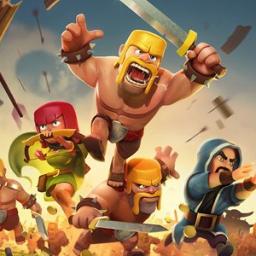
Some say this is an awesome time to be a gamer. I don't agree: I'd say things are getting worse, not better. Start with the
freemium model of game development, to which Henry Dowling says,
There's a rancid stench wafting around the gaming industry of late, and it can only be attributed to the advent and subsequent growth of the freemium business model ... Vampiric developers and their publisher overlords sit hunched over analytic spreadsheets, chuckling throatily about nefarious things like coercive monetisation, pay walls and progress gates.
Then, there's the endless patching. Think about it: yes, games are more complex these days, but the
size of patches being shipped out now surpasses the size of the games themselves back in the day. Erik Fredericksen writes,
This isn't cleaning up code or fixing minor functionality issues, this is modifying massive parts of games. This is delivering the passenger seats a month after I bought the car.
And don't even get me started on gaming culture. Wired has just published a
highlight on online harassment . For starters, just look at
all the abuse one female gamer has collected in a couple years of playing.
It all might just make you
nostalgic for 1994 again , when everything was OK and 16 bits were all you needed.
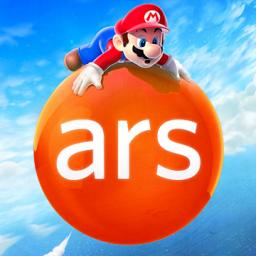
In 2014, the gaming industry presents
a new landscape once again . All three of Microsoft, Sony, and Nintendo have new consoles (
XBox One ,
Playstation 4 , and
Wii U ), PC Gaming is back in a big way, and Valve is on the horizon with their new
Steam Box platform . This says nothing about the emergence of mobile, casual, and free-to-play gaming paradigms as well.
With all the changes, ArsTechnica has suggested that the present business case(s) for Nintendo, in particular, are under severe threat and have offered up
their suggestions for bringing Nintendo back to the fore . Ars' suggestions include: (1) target quantity over quality for their main franchises (a la Activision), (2) find the next game design visionary, and (3) go mobile and to the internet.

A recent study out of the University of Rochester investigating the link between violence and video games suggests that it's
gamer frustration and not game content that may lead to feelings of aggression. The study found that games with poorly-designed controls or excessive difficulty led to player frustration which, in turn, led to feelings of aggression, and this was independent of whether the game's content was violent or not. This study is an interesting and potentially important addition to the long-running debate on the possible connection between video games and aggressive behavior. A further analysis is available
here .
[Ed. note: so, if
your word processor frustrates you , does that lead to violence too?
Because it seems like it might .]

Microsoft proves its security team is still top notch. Turns out, the backdoor password was a
series of spaces. Kristoffer discovered that if he simply pressed the space bar to fill up the password field, the system would let him in to his dad's account.
Sounds like the Windows 98 network login dialog - the one where you just press "Cancel" and it lets you log into the desktop, networking still enabled.
How do you deal with a software release that goes bad? Ask Squad, creators of the fantastic
Kerbal Space Program , a fun game where players create their own space program and try to build a space-worthy craft, capable of flying its crew out into space without killing them. The collection of parts must be assembled to create a functional ship. Each part has its own function and will affect the way a ship flies (or doesn't).
But shortly after hyping the release of a new patch to the game ("Asteroid Redirect Mission" or ARM), Squad was bitten by the notorious Space Kraken: a game breaking bug was discovered that pushed the patch release into "sometime in April." Fans were not happy. Fortunately, Squad took the high road. They publicly admitted to the P.R. error and asked their fans for understanding. Then they quickly issued fixes for that bug as well as a small game-save bug that cropped up, putting all their energy behind making things right. With fans appeased, anticipation again mounts for the Kerbal Space Program to leave Alpha development phase.
Though development does still have a long way to go, KSP is already rich with content and has a large modding community. If you have any interest in physics based space games, this one is genuinely a step up from anything else, even Orbiter. You'll need a high-end gaming computer at the moment.
Check the forums for details, including issues regarding 64 bit and Linux support.
Asteroids was never this much fun, or as difficult!
(cross submitted to Soylent News)
[2014-04-02 14:53 UTC: re-edited for clarity: the PR was about the asteroid redirect patch]
The first expansion pack of the popular Blizzard game
Diablo 3 will soon go live. The expansion introduces a new character class, the Crusader, adds new areas to explore in Act V, and raises the level cap to 70.
Release schedule for the Americas:
- 9:00 p.m. PDT on March 24
- 10:00 p.m. MDT on March 24
- 11:00 p.m. CDT on March 24
- 12:00 a.m. EDT on March 25
Release times for other areas are
listed here.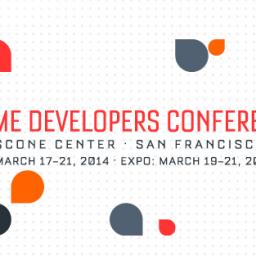
German videogame producer Crytek had long been suggesting they would offer official Linux support for their CryENGINE game engine some day. That day is now.
According to a
post on their website last week, we now know that at the
GDC (Game Developers Conference) that began yesterday, attendees will be able to see this version of the engine in action. They have not mentioned which games they plan on demonstrating.
CryTek is well known for the popular games the Crysis series and Far Cry,as well as Ryse: Son of Rome. From their website:
During presentations and hands-on demos at Crytek's GDC booth, attendees can see for the first time ever full native Linux support in the new CRYENGINE. The CRYENGINE all-in-one game engine is also updated with the innovative features used to recreate the stunning Roman Empire seen in Ryse - including the brand new Physically Based Shading render pipeline, which uses real-world physics simulation to create amazingly realistic lighting and materials in CRYENGINE games.
There will also be games on offer, with the latest version of free online FPS Warface available to play.
Anyone ready for Star Citizen on Linux? And if you're in the San Francisco area, how about giving your fellow readers a word about how it looks?
 The Kerbal Space Program has just released an update called "First Contract," a name chosen by the popular indie game's active user community. It introduces the concept of funds and contracts to the basic science career mode, giving a sense of purpose to the space agency simulator.
The Kerbal Space Program has just released an update called "First Contract," a name chosen by the popular indie game's active user community. It introduces the concept of funds and contracts to the basic science career mode, giving a sense of purpose to the space agency simulator.




